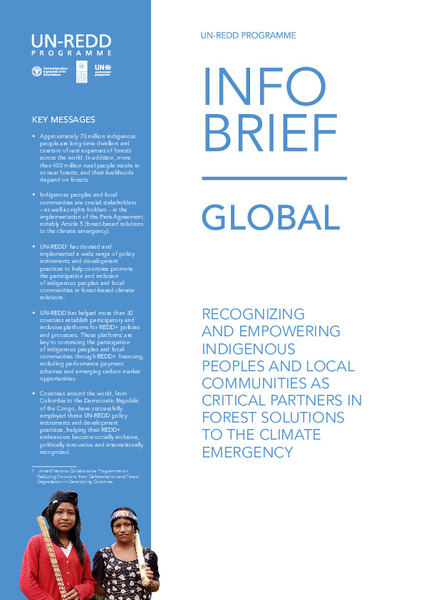| dc.contributor | Ecosystems Division | en_US |
| dc.contributor.author | United Nations Environment Programme | en_US |
| dc.contributor.author | Food and Agriculture Organization of the United Nations | en_US |
| dc.coverage.spatial | Global | en_US |
| dc.coverage.spatial | Colombia | en_US |
| dc.coverage.spatial | Democratic Republic of the Congo | en_US |
| dc.coverage.spatial | Peru | en_US |
| dc.coverage.spatial | Viet Nam | en_US |
| dc.coverage.spatial | Papua New Guinea | en_US |
| dc.date.accessioned | 2024-02-21T10:01:01Z | |
| dc.date.available | 2024-02-21T10:01:01Z | |
| dc.date.issued | 2024-02 | |
| dc.identifier.uri | https://wedocs.unep.org/20.500.11822/44919 | |
| dc.description | Over the past decade, UN-REDD has developed and deployed a rich set of policies and practices to advance social inclusion and equity in REDD+ endeavours, with a focus on the rights of indigenous peoples and local communities and on gender equality. Since its inception in 2008, the Programme has supported inclusive, gender-responsible policy formulation and decisionmaking for national and subnational REDD+ processes. This approach is based on recognition of the fact that the women and men
who live within or in close proximity to forests and whose livelihoods depend directly on them, are not only the most affected by policy decisions regarding forest and land use, but are also the best positioned to protect and sustainably manage forests. The rights and knowledge of local communities and indigenous peoples deserve primary consideration. To underpin this approach, the Programme delivers technical support to REDD+ countries in three interrelated areas: social inclusion, gender equality and forest
tenure, governance and carbon rights. | en_US |
| dc.format | pdf | en_US |
| dc.language | English | en_US |
| dc.rights | Public | en_US |
| dc.subject | indigenous people | en_US |
| dc.subject | forest conservation | en_US |
| dc.subject | social integration | en_US |
| dc.subject | community participation | en_US |
| dc.subject | social equity | en_US |
| dc.subject | case study | en_US |
| dc.subject | Colombia | en_US |
| dc.subject | Democratic Republic of the Congo | en_US |
| dc.subject | Peru | en_US |
| dc.subject | forest management | en_US |
| dc.subject | Viet Nam | en_US |
| dc.subject | gender equality | en_US |
| dc.subject | Papua New Guinea | en_US |
| dc.title | Recognizing and Empowering Indigenous Peoples and Local Communities as Critical Partners in Forest Solutions to the Climate Emergency. UN-REDD Programme Info Brief Global | en_US |
| wd.identifier.sdg | SDG 5 - Gender Equality | en_US |
| wd.identifier.sdg | SDG 15 - Life on Land | en_US |
| wd.topics | Nature Action | en_US |
| wd.identifier.pagesnumber | 15 p. | en_US |


